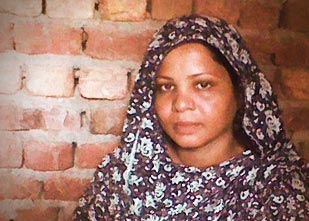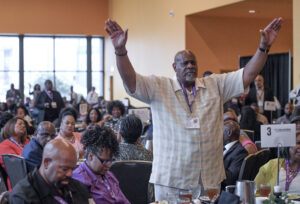
LAHORE, Pakistan (BP) — In spite of protests within Pakistan and abroad against the country’s blasphemy laws, the Lahore High Court upheld Thursday (Oct. 16) the death sentence for a Christian mother accused of insulting Islam’s prophet Muhammad.
 Aasiya Noreen, commonly known as Asia Bibi, is the first woman to be sentenced to death for blasphemy in Pakistan. The mother of five was arrested in June 2009 after Muslim co-workers beat her when she refused to convert to Islam; her death sentence was announced in November 2010.
Aasiya Noreen, commonly known as Asia Bibi, is the first woman to be sentenced to death for blasphemy in Pakistan. The mother of five was arrested in June 2009 after Muslim co-workers beat her when she refused to convert to Islam; her death sentence was announced in November 2010.
Naeem Shakir, Bibi’s lawyer, will appeal the decision to the Pakistani Supreme Court, he told Morning Star News, but huge backlogs at the court could delay the appeal three years.
Bibi’s husband, Ashiq Masih, told Morning Star News that they were hoping for some relief but that the verdict had devastated the family.
“I met Asia in prison a month ago,” he said. “She’s fine and was hoping to hear good news, but, alas, our ordeal is not over yet.”
Justice Anwarul Haq and Justice Shahbaz Ali Rizvi had rejected Bibi’s appeal, even though there were glaring contradictions in witness testimonies, Shakir said.
“I pointed out the conflicting accounts of the prosecution witnesses, as each one of them had a different narrative regarding the exact location where the local village council was convened in which Asia had allegedly confessed that she had spoken ill of Islam’s prophet and sought forgiveness from the villagers,” Shakir said. “There is also discrepancy in the number of people present as each witness gave different figures.”
In addition, the court did not take into account that the First Information Report (FIR) against her was registered six days after the alleged incident, “which clearly shows that the case was a premeditated conspiracy against the Christian woman,” Shakir said.
The complainant in the case, Qari Salem, was not even present in the berry fields where the alleged incident had occurred, Shakir said.
“One of the witnesses, a female co-worker of Asia named Maafia, used to study the Koran from Salem’s wife, and we believe that she is the one who provoked Salem, a prayer leader of the village’s local mosque, to lodge a case against Asia as she and her sister, Asma, had an altercation with Asia in the berry fields over drinking water from the same bowl,” Shakir said.
Bibi’s appeal had been delayed several times, but Shakir said he had been confident the verdict would be overturned.
“I was shocked when the judges decided to uphold the sessions court decision,” he said, adding that the court had said that Bibi’s “confession” before villagers was sufficient evidence while ignoring that any such confession might have been coerced by Muslim mob.
The courtroom was packed with clerics and members of Islamist extremist groups who supported the prosecution, and they erupted in celebration upon hearing the two-judge panel’s decision to dismiss Bibi’s appeal.
David Griffiths, Amnesty International’s deputy Asia Pacific director, called the ruling a grave injustice.
“Asia Bibi should never have been convicted in the first place — still less sentenced to death — and the fact that she could pay with her life for an argument is sickening,” he said in a press statement. “There were serious concerns about the fairness of the trial, and her mental and physical health has reportedly deteriorated badly during the years she has spent in almost total isolation on death row. She should be released immediately and the conviction should be quashed.”
The ruling is the latest chapter in a long ordeal for Bibi, whose case has focused international attention on how Pakistan’s blasphemy laws have become a weapon against religious minorities.
While Bibi’s death sentence led to international protests, the possibility of overturning it provoked outrage within Pakistan. Punjab Gov. Salman Taseer was slain by his bodyguard on Jan. 4, 2011 because of his support for Bibi and his criticism of the blasphemy law; the bodyguard believed Taseer, a Muslim, had blasphemed by criticizing the law.
Former Minister for Minority Affairs Shahbaz Bhatti, the first Christian, cabinet-level minister, was shot and killed on March 2, 2011 for calling for reforms to blasphemy laws following Bibi’s trial.
“The laws are often used to settle personal vendettas — both against members of minority religious groups and Muslims — while individuals facing charges are frequently targeted in mob violence,” Griffiths said. “Those who speak out against the laws face terrible reprisals. However, the blasphemy laws violate international law and must be repealed or reformed immediately to meet international standards.”
Death sentences have rarely been carried out in blasphemy cases, but that is in part because such allegations have frequently led to deadly vigilante attacks on the accused or their lawyers. Pakistan is nearly 96 percent Muslim, according to Operation World, and religiously charged court cases commonly involve clamoring crowds of Muslims and other pressures coming to bear on lawyers and judges. Of 52 people extra-judicially murdered after being charged with blasphemy in Pakistan, 25 were Muslims, 15 were Christians, five were Ahmadis, one was Buddhist and one was Hindu, according to a report by the Centre for Research and Security Studies.
Bibi was convicted under Section 295-C of the defamation statutes for alleged derogatory comments about Muhammad, which is punishable by death, though life imprisonment is also possible. Pakistan put a de facto moratorium on executions into place in 2008, though one person has been executed since then.
In the harvest fields of Ittan Wali in June 2009, Bibi’s co-workers objected to her touching the container for the water she had fetched, saying that her Christian faith made it impure for them, and they told her to convert to Islam, according to her husband. Her objections were taken as blasphemy, and they beat her before dragging her to a police station, he said. More than 20 men have been sentenced to death under the blasphemy law, most of them Christians, though none have been executed, human rights groups say.
Pakistan’s blasphemy laws have been routinely misused to settle personal scores with false accusations. Police have found most blasphemy accusations to be false during investigation, but accusers can make innocent victims suffer months in jail with quick and easy registration of such cases.
Christians make up 2.45 percent of Pakistan’s population.















